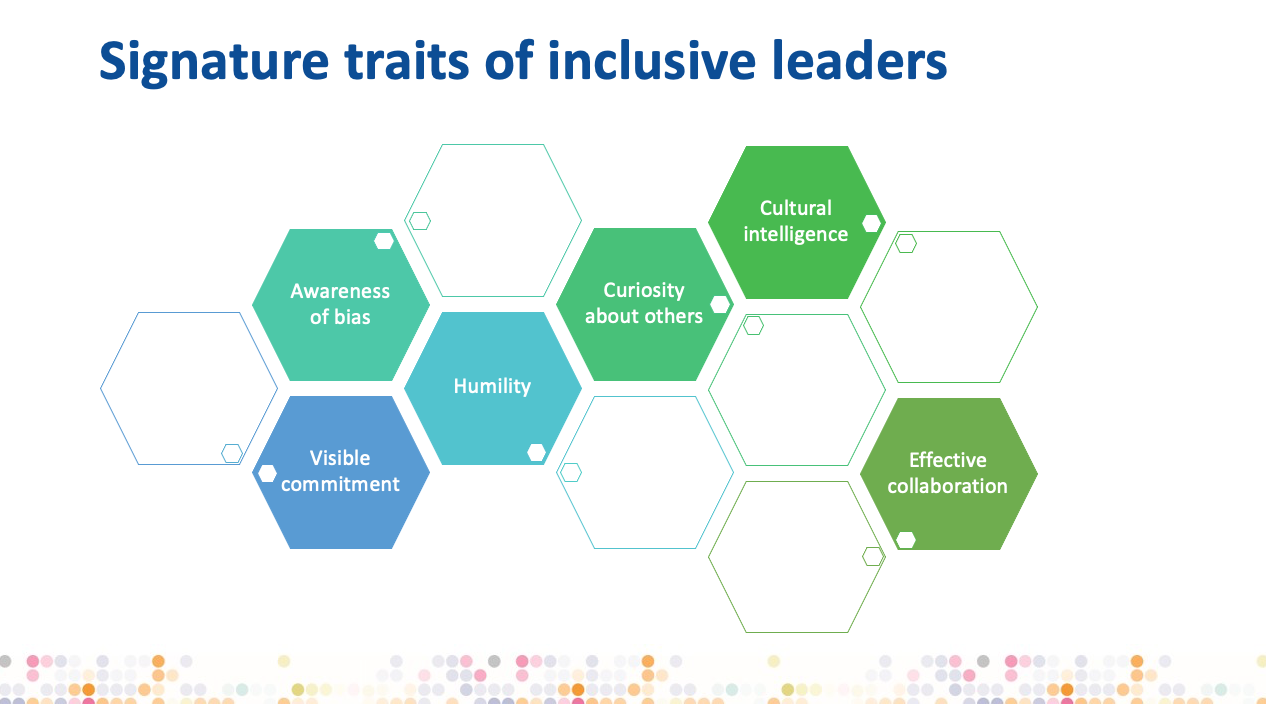Build Inclusive Leadership Skills
“[W]hat leaders say and do makes up to a 70% difference as to whether an individual reports feeling included.”
- Juliet Bourke and Andrea Titus, “The Key to Inclusive Leadership,” Harvard Business Review, March 6, 2020.
Diversity isn't effective without inclusion. Building inclusive culture requires self-analysis, measurable action and accountability.
Inclusion initiatives are only successful with leadership commitment, and that commitment is a personal one.
Does your workplace training measure effectiveness?
Ours does.
A Data-Driven Approach
To assess the effectiveness of the training, we measure knowledge and behaviors before and after the workshop:
Pre-workshop data establishes a baseline, identifying knowledge gaps and areas for improvement.
Post-workshop data measures knowledge gains, shifts in attitudes, and changes in planned behavior.
Ongoing tracking allows your organization to evaluate whether training leads to meaningful, long-term cultural improvements.
A focus on data supports sustained behavior change by identifying trends, reinforcing positive behaviors to create a safer, more respectful work environment.
What Our Inclusive Leadership Course Covers - And How We Do It:
Details
120 minutes (live) plus 30 minutes asynchronous content
Facilitated live by an expert
Activities, breakouts, and more interactive content
Introduction to Inclusive Leadership
Review of elements of inclusion; impact on the workplace
Emotional intelligence skills you will rely on
Principles of change management and your role in DEI success
Subtleties of Inclusion and Exclusion
Recognizing harmful behavior including bullying, abuse, microaggressions and other forms of harassment, being able to take the temperature of a group
Building relationships with team members to understand how individuals experience engagement and inclusion
Self-Assessment
How to identify our own strengths and areas of growth in inclusive leadership
Learning to handle complaints that come to you (about you or others)
Post Workshop support
Materials that reinforce learning by email
Reminders on behaviors that reinforce respect at work
Strategies for addressing challenging behavior
Our Inclusive Leadership Workshops Builds Your Skills
Communicating in a way that prioritizes building trust and respect on our teams and improving collaboration with our colleagues;
Building the emotional intelligence of groups
Identifying our own strengths and areas of growth in inclusive leadership
Why build inclusive leadership skills?
It Enhances Team Performance. Inclusive leaders create an environment where diverse perspectives are welcomed and valued. By encouraging open dialogue and collaboration, they ensure that team members feel comfortable sharing ideas, which can lead to better decision-making and problem-solving.
It Promotes Innovation. Diverse teams led by inclusive leaders are more innovative because they leverage a wide range of perspectives and experiences. Inclusive leaders foster psychological safety, creating a space where employees feel safe to propose new ideas without fear of criticism. This approach encourages creativity and drives innovation.
It Increases Employee Engagement. Employees who feel included and respected are more likely to be engaged and motivated at work. Inclusive leadership builds trust and connection, resulting in higher levels of job satisfaction and a stronger sense of loyalty to the organization.
It Improves Retention. Inclusive leadership helps reduce employee turnover by cultivating a culture where all individuals feel valued and supported. Employees are more likely to stay with organizations where their contributions are acknowledged and their needs are considered.
It Builds Trust and Psychological Safety. Inclusive leaders demonstrate empathy, fairness, and authenticity, which fosters trust within teams. When employees feel psychologically safe, they are more likely to voice concerns, share feedback, and take risks without fear of retaliation, leading to better team dynamics and stronger relationships.
It Strengthens Organizational Reputation. Organizations with inclusive leadership are seen as equitable and forward-thinking, which enhances their reputation with employees, clients, and the broader community. This reputation makes the organization more attractive to top talent and builds trust with stakeholders.
It Facilitates Effective Global Leadership. In a globalized workforce, inclusive leaders excel at managing culturally diverse teams by respecting and adapting to cultural differences. This skill enables leaders to build strong cross-cultural relationships and ensures smooth collaboration across borders.


